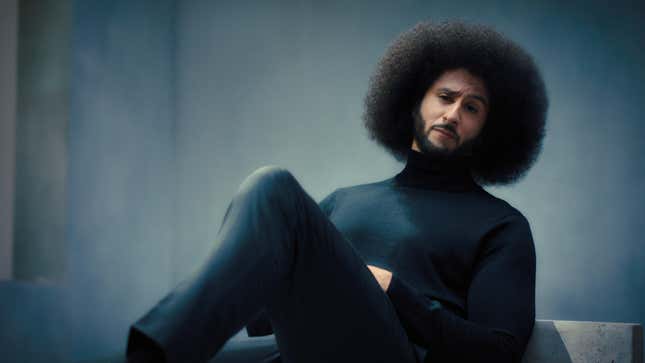
You know, Colin, I’m kinda hurt, bruh.
Your boy at The Root (i.e. me) has been over here riding for you since the dawn of time and you didn’t even holla at me about your upcoming Netflix series Colin in Black and White? No screeners, no interview, no press releases, nothing? I thought we were boys, but clearly, I might need to reevaluate our friendship.
OK, let me get out of my feelings.
With Colin in Black and White set to arrive on Netflix this Friday, the former NFL quarterback spoke to the Los Angeles Times about what we can expect from the new coming-of-age drama that explores his formative years in order to provide context into how he became the iconic figure he is today.
“I had important goals I wanted to achieve in telling this part of my story,” Kap told the Times. “I wanted to create a scripted series around my high school years that addressed race and racism head-on.”
For those unfamiliar with the former San Francisco 49er’s upbringing, he was adopted by a white family as a 5-week-old infant, who then relocated him from Fond du Lac, Wis., to Turlock, Calif., at the age of 4. He would then go on to excel in football, basketball, and baseball—he was an all-state selection in all three during his senior year—and the rest is history.
“The reason we focused on high school years is because they are pivotal in figuring out who you are, where you fit within society, and ultimately what your trajectory is going to be,” he explained. “It allowed us to dive into the complex racial dynamics of my family, my relationships, and society.”
The series was co-created by Ava DuVernay, who, while initially leery about the concept of the series, soon realized its magnitude and went to work to flesh it out into six cohesive episodes. And considering her success with both the thought-provoking 13th and the haunting masterpiece When They See Us, Netflix was the perfect partner to bring Colin’s story to life.
“He had a really clear idea about wanting it to stay in the land of young adulthood and not to move past high school,” DuVernay told the Times. “It took me a second to wrap my mind around that, to be honest. [...] That’s not really my thing, telling the story of young celebrities’ lives, right? What was interesting to me is how those early years fit inside a larger cultural and political paradigm. What is the context for these actions of a young person, the experiences or the realizations he’s having? How does that connect into a larger conversation about race, class, culture, identity, all of that good stuff?”
And true to his quarterback DNA, Kaepernick insists he was heavily involved in the development and execution of this series.
“As a co-creator and executive producer, I was involved in all aspects of the show—from its creation, to its script, to the casting decisions, format and final cuts,” he said. “The format and structure of the show became critically important because one of my goals was to tell a great story without ambiguity as to the messaging behind it.”
“He was a filmmaking novice,” DuVernay said. “But he is a quarterback. I was shocked at the way that his mind worked.”
While the ultimate goal of television is to provide entertainment, Kap is clear that the show also seeks to inspire and empower its audience.
“I want Black and brown communities, particularly youth, to know we will face racism, we will face white supremacy, we will face oppressive systems, but we have the power to overcome them and the power to change them,” he said. “I want them to know we don’t have to accept the status quo, and ultimately, I want them to be their full selves and to stand firmly in their full power.”
Talk that talk, Black man.
Colin in Black and White premieres on Friday, Oct. 29 on Netflix.

